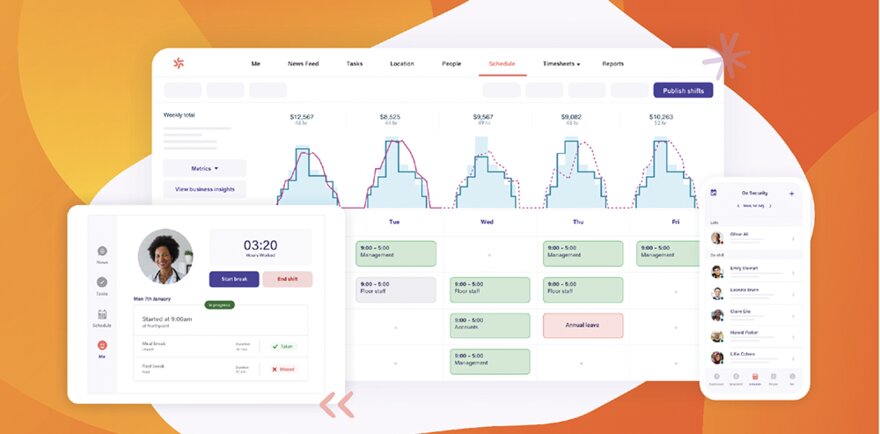Workforce management software can relieve the hefty burden of managing ever-changing staff rotas, approving holiday requests, tracking attendance and getting payroll right
Hospitality businesses are adopting workforce management (WFM) systems to help them optimise processes such as demand forecasting, budgeting and rota scheduling and to simplify time-consuming tasks such as payroll, holiday requests and attendance tracking. But another key area where more sophisticated WFM technology can help is with recruitment and onboarding.
Jane Pendlebury, chief executive of HOSPA, says: "The post-Brexit, post-pandemic world has caused the hospitality talent pool to shrink dramatically. Given the difficulties, it's no surprise that WFM technology is emerging as a key recruitment tool as operators look to gain an edge. HR departments are now often called ‘people and culture departments'; by removing some of the admin headaches around recruitment and onboarding, these teams will be in a better position to focus on that aspect."
Pendlebury offers some examples of how WFM systems can help to make workplaces appear more attractive to job-seekers. "You can create branded career microsites that showcase your employment benefits. You can also use WFM to store and manage job applications, helping to reduce the admin headache."
WFM's applicant tracking features also minimise the time-consuming business of sifting through applications by summarising CVs, screening candidates, scheduling interviews and more. For successful applicants it also helps to create a seamless transition into onboarding and training.
"You can use learning management systems within WFM to create training material, helping to create a consistent approach to onboarding. It also aids hoteliers and operators in performance tracking and feedback as staff grow into their role," Pendlebury says.
"The fundamentals of hospitality – good service and so on – remain unchanged, but we should be looking to take advantage of these emerging technologies and ancillary services to, ultimately, make it easier for us and our wider teams," she adds.
Case study: Atlas Hotels' no-mistakes payroll in 30 minutes
Operator Atlas owns and operates 55 Holiday Inn Express hotels, two Hampton by Hilton hotels and one Holiday Inn under licence agreements with IHG and Hilton
Location UK
Employees 800
WFM supplier Deputy
Atlas Hotels made the switch to Deputy WFM in 2021. Its previous system was a bolt-on to its purchasing software, and managers and the operations and finance teams were relying on Excel spreadsheets, leading to confusion around payroll and shift management.
The teams wanted a tailormade WFM system that was user-friendly and able to: improve the employee experience and retention; standardise and manage staff scheduling by building rotas based on structures, forecasting and business needs; control payroll costs and improve visibility; connect and integrate better with an HR system; and improve leave management.
David Drummond, cluster operations manager at Atlas, says the implementation of Deputy has improved levels of employee satisfaction. Staff can now, for instance, book holidays and see their salary via the app.
Managers benefit, too. The payroll used to take three hours; it now takes 30 minutes and there are no mistakes. "Managers can now spend time with their team and guests, and not sit in front of the computer all day," says Sub Iyer, head of operations at Atlas.
Drummond adds: "We've gone from hours to seconds for reporting, showing who's working at which hotel and payroll reconciliation. Overtime, deduction, sick pay, holidays – the system has helped us manage these better and enabled us to capture the right cost in the right month."
Deputy can also learn from previous shift patterns and create bespoke scheduling rules that allow staff to have better work-life balance. For instance, the system knows not to schedule a shift for an employee who hasn't had a weekend off in four weeks.
Iyer says: "Prior to Deputy, the recurring complaints in our employee engagement survey were around a lack of work-life balance. We can't control external labour market conditions, but we can control doing everything we can to make our existing employees happy. Since we implemented Deputy, those complaints have fallen to five from 766 employees. The system also makes it easier for hotel staff to trade shifts while ensuring every swap is within budget and compliant, avoiding frustrating situations and saving time."
Iyer acknowledges that a key challenge was change management. "Getting longer-standing employees used to a digital system required patience, a mix of carrot and stick, and lots of positive reinforcement. We also trialled the system in a couple of hotels before launching it across all of them. This helped us generate word of mouth and create digital champions."
Deputy has been supportive throughout and its focus on user experience and approach to partnership were key factors in Atlas's decision to use the system.
"The Deputy team have been adaptable and the customer service has been excellent," Drummond says. "We also still interact regularly with the product development team, and any issues are fixed quickly."
Case study: Viva Italia Group's staff onboarding is a paper-free breeze
Operator Viva Italia Group, whose brands include Tony Macaroni, T2G, Nardini, the Wine House 1821 and Bar182
Location Scotland and Northern Ireland
Employees 700
WFM supplier Nory
As Viva Italia Group started to grow, its WFM system began to buckle under its own weight, with challenges that would take hours to fix manually. It also relied solely on on-premise hardware to communicate with staff, which made maintaining a rota of deskless employees a time-consuming task. What's more, the turnaround time for customer support was often an untenable 48 hours.
The group therefore turned to Nory, a foodtech start-up. Its platform offers real-time support to promptly resolve system issues, an intuitive design for staff scheduling, and easy management of schedules. New and useful features are continually added to the platform.
"Onboarding has become an absolute breeze, with new team members becoming a part of the family in less than five minutes, and without the use of a single paper form," says Viva Italia's operations manager Liam Simmons.
The new Nory system means that, in an average month, the group efficiently manages 330 holiday requests, onboards 107 new staff, processes around 90 leavers, publishes 90 work schedules, and exports 111 timecards.
All team members can manage their shifts on the go through the mobile app. Nory also integrates with the group's point-of-sale system, thereby offering real-time visibility of the cost of labour. This advantage enables the group to make informed business decisions.
Whereas under the old system, Viva Italia's managers were knee-deep in dealing with holiday requests, the Nory platform consolidates them all in one place, allowing the managers to concentrate on the crucial task of running their restaurants.
According to staff feedback, the platform is also user-friendly, particularly in terms of scheduling, and it is continuously improving and adapting to users' needs.
"The accompanying mobile app simplifies team WFM, letting staff self-serve. They can manage their shifts, request holidays and communicate with other team members, all from one central place. New team members can onboard in minutes, and managers can handle all operations on the move," says Simmons. "Nory has transformed the group's operations, making it a trendsetter in the modern hospitality landscape."
Case study: Gusto Italian's staff churn slashed
Operator Gusto Italian has 14 restaurants
Location UK
Employees 500
WFM supplier Access Group (Rotaready and CPL Learning)
The restaurant group Gusto Italian moved from a legacy people management solution that had "massive room for human error" to Rotaready in 2022. At the same time, it also implemented applicant tracking, payroll, and learning and development through CPL Learning.
The move has helped the business to strengthen its recruitment position, streamline its onboarding, increase operational efficiencies and improve the employee experience. Anne-Marie Sarantis, Gusto's head of people, explains how onboarding has improved: "The biggest game-changer has been the integration of products, ensuring that information is automatically shared across our applicant tracking system, rotas, comms and training platforms, and payroll provider. This makes our employee administration self-managing and provides consistency across all restaurants so that all new starters get the same experience."
As new starters' details are already on file, their first day is all about being introduced to the team and the Gusto culture rather than filling in forms. They will have also received their rota for the first week in advance, so they can plan their social life around work commitments. It all strengthens their trust in Gusto as an employer.
And because all the apps sit within a team communication platform, there is no need for staff to log into multiple apps.
Sarantis says: "It's all about the age demographic. The team we're recruiting now has the expectation that everything will just happen for them, and that is how the Rotaready integration works. It's a huge benefit."
It also helps with the company's drive to recruit from overseas. To make relocation less daunting, recruits are automatically set up on Rotaready and can complete their online training through CPL Learning before they start. As well as compliance training, there is a module about how it feels to work at a Gusto.
For Sarantis, a reduction in staff turnover is one measure of the success of the Rotaready integration project. She says: "We weren't alone in posting a high turnover after Covid, but it highlighted that we had to up our game and think about employee experience and what we were doing to look after our people. Our annual staff turnover is currently tracking at 52% whereas it was previously 140%."
Similarly, the company traditionally reported on how many staff left within their first 90 days, but it has now been able to focus on a longer-term view. Employees who leave within 90 days of starting have now dropped to 32%, which includes some incorrect hires. And new starter compliance on its CPL Learning statutory courses/legal requirements before the first day stands at 98%.
"We now have a wellbeing meeting after 90 days and set up a personal development plan to help staff retention and reach the important six to 12-month period," Sarantis says.
The integrated technology stack has also helped the group reduce its time to hire. Sarantis says: "With everything laid out through our communication platform, our new hires are reassured. Having visibility of employment details, upcoming shifts, personalised training programmes and payroll information plays an important part in ensuring they don't move to a competitor before they even start."
Continue reading
You need to be a premium member to view this. Subscribe from just 99p per week.
Already subscribed? Log In













